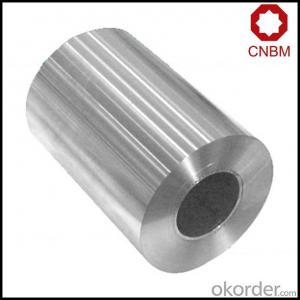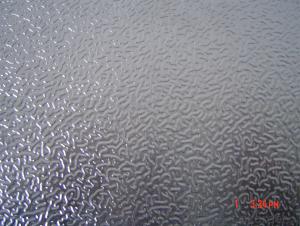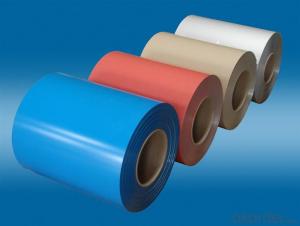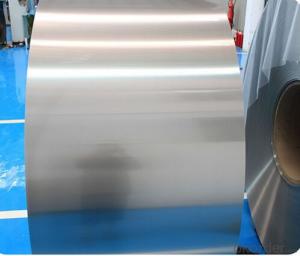Aluminium Coil/Aluminium Strip China Supplier with Good Price 1XXX 3XXX 5XXX
- Loading Port:
- Shanghai
- Payment Terms:
- TT OR LC
- Min Order Qty:
- 5 m.t.
- Supply Capability:
- 10000 m.t./month
OKorder Service Pledge
OKorder Financial Service
You Might Also Like
Item specifice
1. Specification of Aluminium Coil/Aluminium Strip China Supplier with Good Price 1XXX 3XXX 5XXX
1) Alloy | 1050, 1060,1100, 3003 3004 3105 3A21 5005 5052 etc |
2) Temper | O/H12/H14/H1/H18/H32/H34/H36/H38//H111/H112/H116/H321/T6/T651/T3/T351 etc |
3) Thickness | 0.1mm to 6mm |
4) Width | 20mm to 3300mm |
5) Coil weight | 100kgs to 6 tons depends on actual requirement |
6) Core material | Aluminum or paper |
7) Coil Inner diameter | 75mm, 150mm, 200mm, 300mm, 405mm, 505mm or as required |
8) Protective film can be added
2. Application of Aluminium Coil/Aluminium Strip China Supplier with Good Price 1XXX 3XXX 5XXX
(1).Interior: wall cladding, ceilings, bathrooms, kitchens and balconies, shutters, doors...
(2).Exterior: wall cladding, facades, roofing, canopies, tunnels,column covers , renovations...
(3).Advertisement: display platforms, signboards, fascia, shop fronts...
3. Feature of Aluminium Coil/Aluminium Strip China Supplier with Good Price 1XXX 3XXX 5XXX
*Such coil is specially designed to replace aluminum ingot, due to the high export tax of aluminum ingot, the coil has better price than ingot.
*This type of coil can fit customer's remelting furnace just like ingot, no need to make any change to the production line that was previously used for ingot. The standard coil size and weight is very suitable for the feed gate of furnace.
*This type of coil causes less material wastage than ingot when remelted.
*Our coil is made directly from ore, no need to go though the ingot making process, quality is much better than other suppliers who use ingot scrap to make coil.
Be free from Oil Stain, Dent, Inclusion, Scratches, Stain, Oxide Dicoloration, Breaks, Corrosion, Roll Marks, Dirt Streaks and other defect which will interfere with use
4. Certificate:
SGS and ROHS(if client request, paid by client), MTC(plant provided), Certificate of Origin(FORM A, FORM E, CO), Bureau Veritas and SGS (if client request, paid by client), CIQS certificate
5. Image of Aluminium Coil/Aluminium Strip China Supplier with Good Price 1XXX 3XXX 5XXX
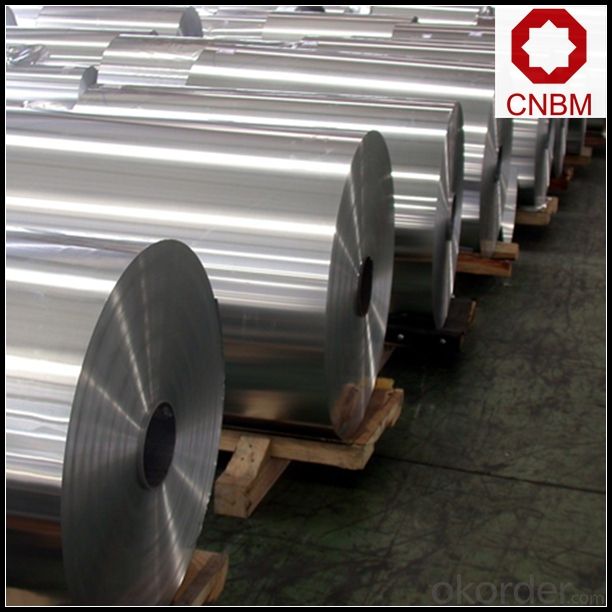
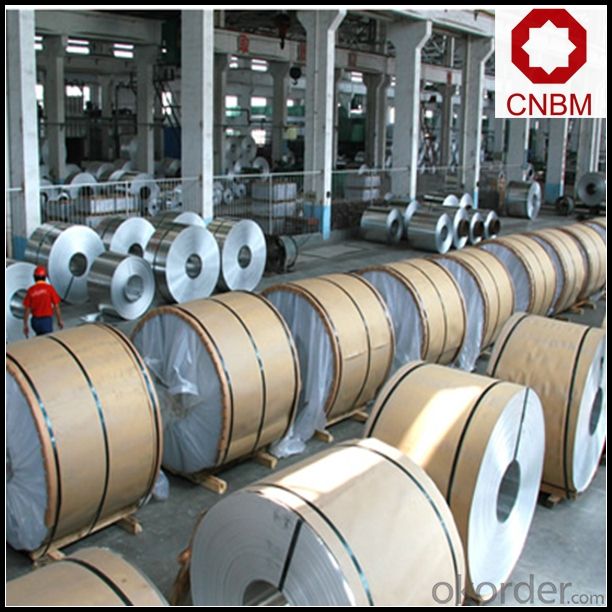
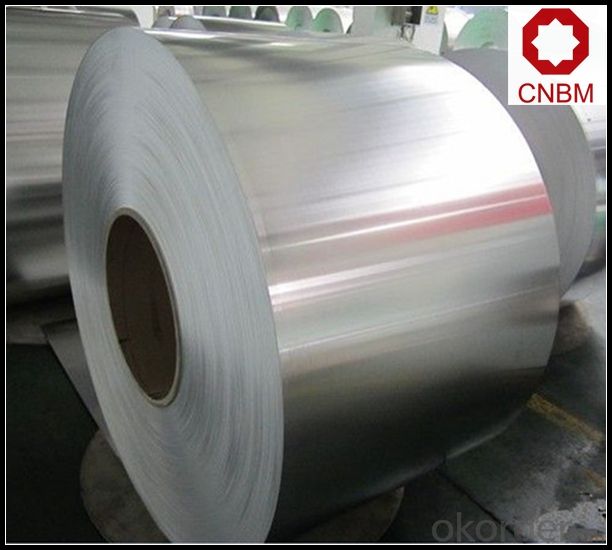
6. Package and shipping of Aluminium Coil/Aluminium Strip China Supplier with Good Price 1XXX 3XXX 5XXX
eye to wall
eye to the wall
with wood pallet (wooded case also available)
7. FAQ
1) What is the delivery time?
Dpends on actual order, around 20 to 35 days
2)What is the QC system:
We have QC staff of 20 persons and advanced equipment, each production is with MTC traced from Aluminum ingot lot.
3) What market do you mainly sell to?
Australia, America, Asia, Middle East, Western Europe, Africa etc
- Q:How do aluminum coils compare to other materials in terms of strength?
- Aluminum coils are known for their excellent strength-to-weight ratio, making them highly competitive compared to other materials. While materials like steel or copper may have higher absolute strength, aluminum coils offer comparable strength with significantly lighter weight, making them ideal for various applications where weight reduction is crucial.
- Q:I take an extracurricular aircraft class, and I got the okay to take some old painted sheet aluminum for another project I'm working on. The problem is, what I'm using it for I need bare aluminum. I heard around that air crafts are painted with something that regular (store-bought) paint stripper can't remove. Is this true? I am aware of the fact that stripping something like that will result in a toxic paint sludge, so I've taken precautions for that. I just need to know if heavy-duty paint stripper from Home Depot will do the job. Thanks :)
- As above, an automotive shop might be able to help you with the correct stripper. If you can find someone who does aircraft finishing, he might help you. A lot of aviation type finishes (Imron, for example) are used in upper end automotive shops for exclusive finishing. You might get some help there. I would be careful about using ordinary strippers on aircraft aluminium. If your project is not going to fly, you would be safe. You might scratch the finish on your sheet though, getting the old paint off. If your project is going to fly, you need to use the correct process. It seems to me that (some time ago), I have heard of a sandblast process, using crushed walnut shells rather than sand, to remove paint from aircraft. Failing all that, you can try a commercial stripper on a small corner of your aluminium sheet to see what it does. Whatever you do, good luck, and have fun. It sounds to me like you could turn this into a research project all by itself.
- Q:Can aluminum coils be used in heat exchangers?
- Yes, aluminum coils can be used in heat exchangers. Aluminum is commonly used in heat exchanger applications due to its excellent heat transfer properties, lightweight nature, corrosion resistance, and cost-effectiveness.
- Q:Are aluminum coils suitable for automotive heat shields?
- Indeed, automotive heat shields can indeed be made using aluminum coils. Aluminum, owing to its exceptional heat resistance and thermal conductivity characteristics, is extensively employed in the automotive sector. Its lightweight nature and remarkable strength-to-weight ratio render it a perfect option for heat shields. Through the utilization of aluminum coils, heat dissipation can be effectively achieved, thereby safeguarding delicate components from excessive heat exposure. Moreover, aluminum exhibits corrosion resistance, a vital attribute for automotive applications, given the exposure of heat shields to diverse environmental conditions. In conclusion, aluminum coils provide the essential properties and performance needed for automotive heat shields.
- Q:What are the different alloys used in aluminum coils?
- Aluminum coils are made using various alloys, each possessing unique properties and applications. Some commonly employed alloys include: 1. 3003: Renowned for its exceptional formability and resistance to corrosion, this alloy finds frequent use in applications requiring moderate strength, such as automotive components, storage tanks, and kitchen utensils. 2. 5052: An alloy characterized by its versatility, good corrosion resistance, high fatigue strength, and excellent weldability. It is commonly utilized in the production of aircraft fuel tanks, marine components, and architectural applications. 3. 6061: Distinguished by its high strength and excellent machinability, 6061 is often employed in structural components like frames and braces. It also offers good corrosion resistance, making it a popular choice in the aerospace and automotive industries. 4. 8011: Primarily used in the packaging industry, particularly for manufacturing aluminum foil. This alloy provides good formability, high tensile strength, and excellent resistance to moisture and chemicals. 5. 1100: A commercially pure aluminum alloy, prized for its high electrical and thermal conductivity. It is commonly utilized in electrical wiring, heat exchangers, and lighting fixtures. These examples represent only a fraction of the alloys available for aluminum coils, as there are numerous other variations tailored to specific requirements and applications. The choice of alloy depends on several factors, such as desired strength, corrosion resistance, formability, and cost considerations.
- Q:Are aluminum coils suitable for architectural cladding?
- Architectural cladding can indeed utilize aluminum coils. Aluminum, a versatile and aesthetically pleasing material, is widely used in the construction industry due to its lightweight nature and durability. Aluminum coils can be easily shaped into various forms and sizes, making them perfect for architectural cladding applications. One of the notable advantages of using aluminum coils for cladding is their resistance to corrosion. Aluminum naturally develops a protective oxide layer, preventing rusting and deterioration over time. Consequently, aluminum proves to be a durable and low-maintenance option for architectural cladding. Moreover, aluminum coils offer a wide array of finishes and colors, providing greater design flexibility. Architects and designers can paint or coat them to match any architectural style or design concept, making aluminum coils a favored choice. Furthermore, aluminum is an environmentally friendly material. It is fully recyclable and has a significantly lower carbon footprint compared to cladding materials like steel or concrete. This makes aluminum coils a sustainable option for architectural projects. To sum up, aluminum coils are indeed suitable for architectural cladding due to their durability, corrosion resistance, design flexibility, and environmental benefits.
- Q:Are there any limitations on the width-to-thickness ratio of aluminum coils?
- Yes, there are limitations on the width-to-thickness ratio of aluminum coils. The width-to-thickness ratio is an important factor in determining the overall strength and performance of aluminum coils. If the ratio is too high, it can lead to issues such as buckling, warping, or even failure of the coil. The specific limitations on the width-to-thickness ratio depend on various factors such as the alloy composition, temper, and intended application of the aluminum coil. Different alloys and tempers have different mechanical properties and can handle different ratios. Additionally, the intended application of the coil, such as roofing, automotive, or packaging, may have specific requirements for the width-to-thickness ratio. Manufacturers typically provide guidelines and specifications for the acceptable width-to-thickness ratio based on their product offerings. These guidelines ensure that the coils are used within their intended capabilities and prevent any issues related to excessive width-to-thickness ratios. It is important for users and designers to consider these limitations and guidelines when selecting and utilizing aluminum coils. Failure to adhere to these limitations can result in compromised performance, increased risk of damage, and potential safety concerns. Therefore, it is crucial to consult the manufacturer's recommendations and industry standards to determine the appropriate width-to-thickness ratio for a given application.
- Q:Are aluminum coils suitable for electrical conductors?
- Yes, aluminum coils are suitable for electrical conductors. Aluminum is a good conductor of electricity, second only to copper in terms of conductivity. It is widely used in various electrical applications, including power transmission lines, wiring, and electrical coils. Aluminum coils offer excellent electrical conductivity while also being lightweight, cost-effective, and resistant to corrosion.
- Q:Can aluminum coils be used in the production of architectural façades?
- Aluminum coils are indeed suitable for the production of architectural façades. Façades made of aluminum are highly favored due to their durability, lightweight characteristics, and aesthetic attractiveness. By incorporating aluminum coils into façade manufacturing, customization becomes effortless, as they can be readily molded and fashioned into different designs and profiles. Moreover, aluminum exhibits resistance against corrosion, rendering it suitable for outdoor use. Furthermore, it possesses exceptional thermal and acoustic insulation properties, thereby enhancing energy efficiency and soundproofing. In conclusion, aluminum coils offer a versatile and efficient choice for the creation of architectural façades.
- Q:What are the different types of edge conditions for aluminum coils?
- Aluminum coils come in various edge conditions, each with its own purpose and function. These edge conditions are designed to protect, improve functionality, and ensure compatibility with different manufacturing processes. Firstly, there is the mill edge, which is the standard edge condition produced during the initial rolling process. It is characterized by a smooth, straight, and burr-free edge. Mill edge coils are versatile and can be easily processed further. Next, there is the slit edge, which is created by cutting mill edge coils into narrower widths. This process results in a slightly rougher edge compared to mill edge coils. Slit edge coils are commonly used when precise width tolerances are required. Another edge condition is the trimmed edge. Trimmed edge coils undergo additional processing to remove any irregularities or defects along the edges. This is achieved through shearing or trimming the coil. Trimmed edge coils are often used in applications that demand a high level of aesthetics or a uniform appearance. Deburred edge coils have sharp edges or burrs removed through mechanical or chemical methods. This ensures a smooth and safe edge, making them suitable for applications where safety is a concern. Rounded edge coils have their edges rounded or softened to minimize the risk of injury during handling or installation. This is achieved through methods like roll forming or edge rolling. Rounded edge coils are commonly used in industries where safety is crucial. Lastly, there are specialty edge conditions designed for specific applications. These include edge conditions tailored for processes like welding, bending, or forming. Specialty edge conditions cater to the unique requirements of certain industries or applications. When selecting an edge condition for aluminum coils, it is important to consider factors such as aesthetics, functionality, safety, and manufacturing processes. By doing so, the most suitable edge condition can be chosen to meet the specific requirements of the application.
1. Manufacturer Overview |
|
|---|---|
| Location | |
| Year Established | |
| Annual Output Value | |
| Main Markets | |
| Company Certifications | |
2. Manufacturer Certificates |
|
|---|---|
| a) Certification Name | |
| Range | |
| Reference | |
| Validity Period | |
3. Manufacturer Capability |
|
|---|---|
| a)Trade Capacity | |
| Nearest Port | |
| Export Percentage | |
| No.of Employees in Trade Department | |
| Language Spoken: | |
| b)Factory Information | |
| Factory Size: | |
| No. of Production Lines | |
| Contract Manufacturing | |
| Product Price Range | |
Send your message to us
Aluminium Coil/Aluminium Strip China Supplier with Good Price 1XXX 3XXX 5XXX
- Loading Port:
- Shanghai
- Payment Terms:
- TT OR LC
- Min Order Qty:
- 5 m.t.
- Supply Capability:
- 10000 m.t./month
OKorder Service Pledge
OKorder Financial Service
Similar products
New products
Hot products
Hot Searches
Related keywords
